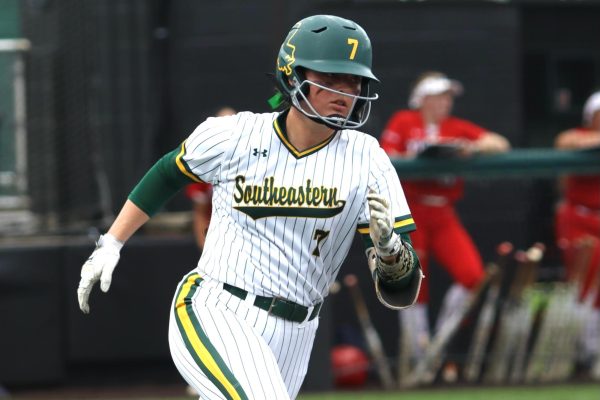Athletes’ social media represents more
To ensure student-athletes represent the university well, regulations are implemented for their social media usage.
Rick Fremin, head coach of softball, advises his players to be cautious of what their social media represents.
“Think before you post, try and be responsible, try to stay away from poor language, and be aware of what you’re connecting yourself to,” said Fremin.
Similarly, Ayla Guzzardo, head coach of women’s basketball, keeps the rule simple: Do not post anything that will be interpreted as inappropriate. Guzzardo also mandates that the players allow the coach to follow their social media accounts to regulate what they post online.
“Each player must allow a designated assistant coach to follow their page,” shared Guzzardo. “If we find out that they have another page, which we will, they will be told to remove all accounts. If they post something inappropriate, they will be spoken to about what is inappropriate and why. Once and if it is done again, they will lose social media privileges.”
While some athletes may not approve of the rules, Guzzardo explained that they are implemented for a reason.
“I don’t believe they truly like the rules given, but I know with everyone on social media and how all young athletes have to explain every emotion on social media, there has to be rules in place and structure for actions,” stated Guzzardo.
Brennan Breaud, a senior infielder, believes the rules regarding social media are created to help athletes represent the university to the best of their abilities.
“They go into depth on it pretty early on in the season,” explained Breaud. “They try to tell us to kind of stay off of posting and reposting because obviously everyone can see, but if it’s anything negative and degrades the program or yourself, you know when you wear a jersey, you’re a part of Southeastern, and you don’t want to disrespect that.”
According to Breaud, the rules are implemented to do more good than harm, and so far, the rules have not been an issue.
“All the athletes do a pretty good job of keeping with the rules,” shared Breaud. “Since I’ve been here, and this is my fourth year, there’s never been a social media problem. Me personally, I don’t post much just because I don’t want to run into that problem.”
Matt Riser, head coach of baseball, pointed out that reposting something is also a representation of oneself.
“We have a departmentwide rulebook that we have to go over the first meeting of the year, but to keep it basic is just ‘Hey, man, just post positive things,'” said Riser. “‘Don’t post anything negative, and also your retweets are a reflection of what you do, so you may not actually text it out, but a retweet is the same thing as saying it.’”
Across the board, the university’s social media policy for athletes remains constant. As long as athletes adhere to the handbook, they are free to post whatever they want.
“We want a positive reflection of what we are and who we are,” explained Riser. “However, sometimes they make mistakes, and those things will be reprimanded at a case-by-case basis. It just kind of depends on the extremity of it and how much we feel like it wasn’t appropriate to do that. If it’s detrimental enough, it could mean removal or dismissal, but that’s in the handbook as well.”
Your donation will support The Lion's Roar student journalists at Southeastern Louisiana University.
In addition, your contribution will allow us to cover our annual website hosting costs.
No gift is too small.






